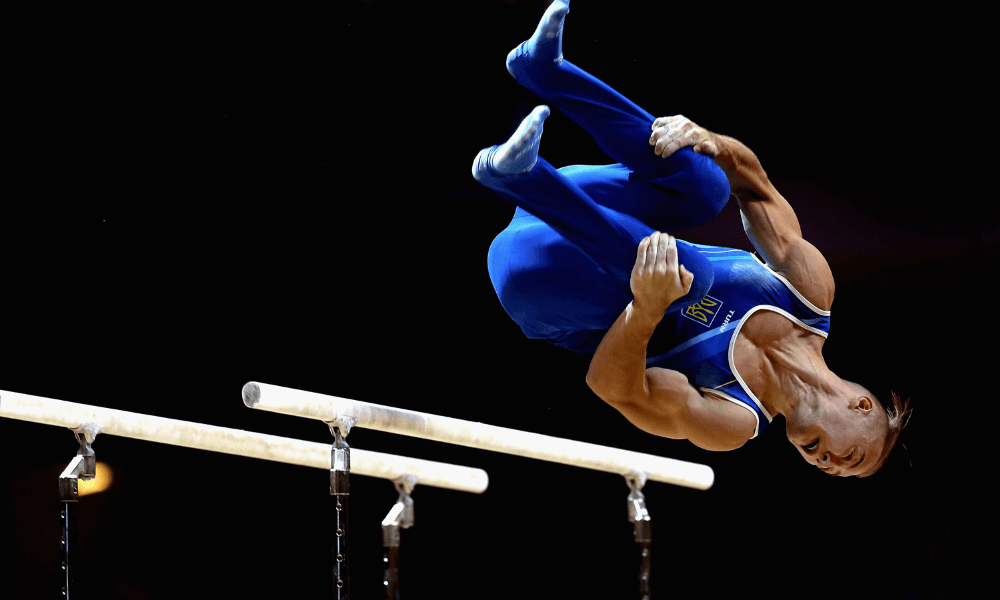
Qatar’s gymnastics training centre is alive with activity as the Ukrainian gymnastics team and other world-class athletes double flip over the vault and perform intricate turns on the horizontal bars.
The Ukrainian team judge Bohdan Makuts introduces himself with a warm smile while keeping an eagle eye on the gymnasts. He understands from decades of experience, how politics consistently overshadows sport, even as athletes try to steer clear.
His country is at war with Russia, his wife is taking care of his 81-year-old mother in the capital, Kyiv, a city under bombardment.
More than 4,000km (2,485 miles) away in Doha, he is supporting a team training for world championships. It is a mental balance beam that he seems to navigate with athletic professionalism.
Recent Topic
How Do You Assess The Value Of An NFT?
Ethereum's 'Consensus Layer' Contract Hits 10M ETH Staked
Chainalysis Launches Free Sanctions Screening Tools
Bohdan was born in Lviv in 1960, which was then folded into the Soviet Union. His city, which borders Poland, has recently become a thoroughfare for refugees escaping from the war. The first time he saw how politics could overshadow sport was while he was competing in the 1980 Summer Olympics in Moscow.
Eighty countries were represented, the lowest number for three decades. That is because it ran concurrently with the Soviet-Afghan war, which led to 66 countries boycotting the games. That year, he says, he pushed on. “I trained for eight hours a day in Moscow, it was really hard work.”
It paid off after he became the 1980 World Cup all-round champion.
He explains that politics were prevalent in everything he did. “I couldn’t visit the United States, Britain and Germany … I couldn’t go to Los Angeles for the Olympics” after the Soviet Union boycotted its 1984 Summer Olympics.
His communist country was ideologically and physically cut off from the West. But his mantra, something he repeated throughout the interview, was to work hard.
Behind him, athlete Ilia Kovtan practised on the horizontal bar, spinning and performing intricate hand grips with apparent ease. He was immediately recognisable.
A photo taken during last month’s medals ceremony hit the world headlines after Russian gymnast Ivan Kuliak stood next to him with the letter Z taped to his shirt. It has become a symbol of the Russian military and support for President Vladimir Putin going to war in Ukraine.
The gymnastics governing body, FIG, has condemned the move and he faces a lengthy ban.
But Bohdan says this had little effect on the Ukrainian gymnasts.
“We didn’t see this we only noticed when the photographer’s pictures came out later, it was not during the competition but only happened at the podium. To be honest, it’s a political problem … What he did is his issue and our goal is just to compete.”
It comes at a time when the International Olympics Committee has recommended against allowing Russia and its ally Belarus to take part under the name or flag of their countries. They should only be accepted as neutral athletes with no national symbols to be displayed.
More than 25 federations followed the advice, including that of athletics, football, badminton, basketball, cycling, motor racing, Paralympics and the FIG.
Many sportspeople have spoken out against the war since, including Russian chess Grandmaster Garry Kasparov, Ukrainian gymnast Oleg Verniaiev and tennis player Elina Svitolina.
Perhaps the most well-known among them are former heavyweight boxer brothers and Hall of Famers Vitali and Wladimir Klitschko – who have taken up arms after enlisting in the Ukrainian reserve army.
Kremlin spokesman Dmitry Peskov condemned the last-minute ban on the Paralympic team in Beijing, saying, “The situation is monstrous, of course. This is a disgrace for the International Paralympic Committee.”
In the gymnasium, the athletes remain professional, continuing to work out on the apparatus in a flurry of activity. But the stress of the war clearly overshadows the interview.
|
|
Pointing to a mobile defibrillator, Bohdan tells media coordinator Natali Khaian that Ukraine desperately needs them for the front line. Natali is a chef, but when the war began, she joined a group called Ukraine SOS and with the Ukrainian embassy in Qatar, leapt into action, coordinating all media activities – from sports teams to verifying videos of the war.
She says the competing teenagers cannot be interviewed as their positions are too vulnerable and they are focusing on keeping their mental and physical health stable. Natali and Bohdan hold a sunny disposition as they introduce their two female star athletes, jesting to guess their age to make them laugh (they look much younger than they are) but their smiles fade quickly. - Cointelegraph.